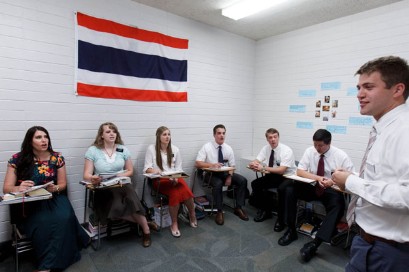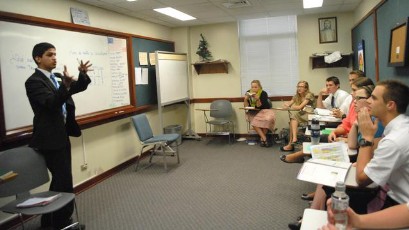Language - Elder Taylor Garrett

Main menu:
- Home Page
- Blog
- Italy Rome Mission
- Where in the World is Taylor Garrett?
- Serving with ...
- LDS Missionaries
- Language
- Photo Galleries
- Links
- Glossary
- FAQ
- Separator 2
- Contact Me
- Logs
- About
- Separator 3
- Family & Friends
Language
In the Italy Rome Mission, 97% of the population within the boundaries of the Mission speak Italian. The other 3% speak Maltese. Learning Italian is essential for being an effective missionary.
The Italian Language
The Italian language is one of the romance languages. The romance languages are languages that have descended from vulgar latin (vulgar meaning "commonly spoken"). Other major romance languages include: French, Italian, Spanish, Portuguese, and Romanian. These are all national languages, but there are numerous dialects, or "sub-languages" in addition.
Since the romance languages are related to each other linguistically, they have some commonality. Linguists have studied the relationships between the different romance languages, establishing numbers called linguistic coefficients. The higher the coefficient, the more similarity there is between the languages. The romance language with the highest linguistic coefficient with Italian is Spanish, at .82. A Spanish speaker will, thus, have an easier time learning Italian than, for example, a French speaker.
How Missionaries Learn the Language
There isn't a lot of time to learn the language before leaving for Italy, particularly when, as in the case of Italian, it is a language that isn't commonly taught in U.S. schools. Missionaries headed for a foreign assignment that is not in their native tongue are given an intensive course (total immersion) in their language, beginning as soon as they arrive at the Missionary Training Center. This program can last from 6 to 12 weeks, depending upon the complexity of the language and its linguistic coefficient with the missionary's native language. For the romance languages, the training is usually 6 weeks.
While this training is enough to provide a foundation, it by no means makes the missionary fluent. That only comes with continued study and hard work once in the mission field. The best way to learn a language is by immersion, and the immersion can be difficult, particularly in a case where a new missionary might have a companion that is a native speaker of the language, but who doesn't speak much (or any) English. Most missionaries who continue to work hard at their language skills, however, will come away after 24 months speaking the language fluently and comfortably.
Learning a foreign language in this way is a great opportunity, but there is no substitute for hard work, and a missionary's language skills are generally a reflection of how hard he or she chooses to work at it. Language study, along with scripture and religious studies, are a regular part of a missionary's daily routine. By study and practice, the language skills come. When a missionary "steps off the boat," he or she usually has a very difficult time understanding what is being said. In contrast, when they "get back on the boat," to go home, they are comfortable and fluent in the language. Sometimes it's even an adjustment to go back to speaking English regularly.
If you've taken Spanish in school, and want to learn Italian, this interesting website outlines many of the similarities and differences.


